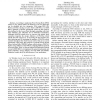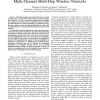133 search results - page 18 / 27 » Fault-Tolerant Power Assignment and Backbone in Wireless Net... |
96
Voted
GLOBECOM
2008
IEEE
15 years 6 months ago
2008
IEEE
— According to employing Power Saving Mode (PSM) scheme or not, stations (STAs) in Wireless Local Area Networks can be classified into two categories: STAs using PSM (PSSTAs) an...
145
click to vote
ICC
2009
IEEE
14 years 9 months ago
2009
IEEE
Typically, topology control is perceived as a per-node transmit power control process that achieves certain networklevel objectives. We take an alternative approach of controlling ...
PODC
2009
ACM
16 years 8 days ago
2009
ACM
In the interference scheduling problem, one is given a set of n communication requests described by pairs of points from a metric space. The points correspond to devices in a wire...
119
click to vote
UIC
2007
Springer
15 years 5 months ago
2007
Springer
Abstract. Recent experimental studies have shown that radio links between low-power devices are extremely unreliable. In particular, the instability and unpredictability of low-pow...
100
click to vote
GLOBECOM
2006
IEEE
15 years 5 months ago
2006
IEEE
— Topology control is the problem of assigning power levels to the nodes of an ad hoc network so as to create a specified network topology while minimizing the energy consumptio...


